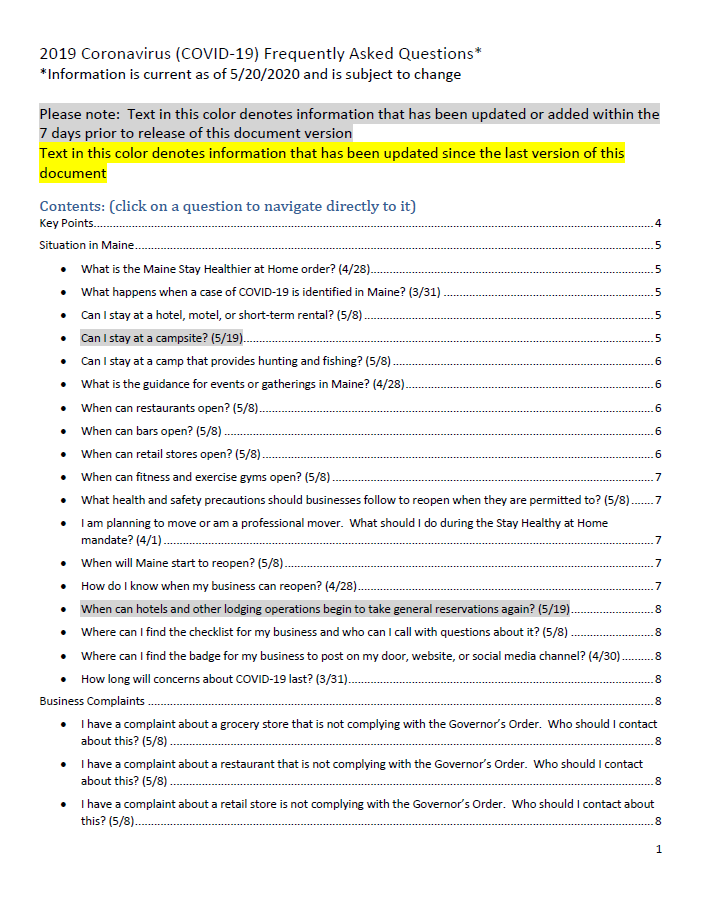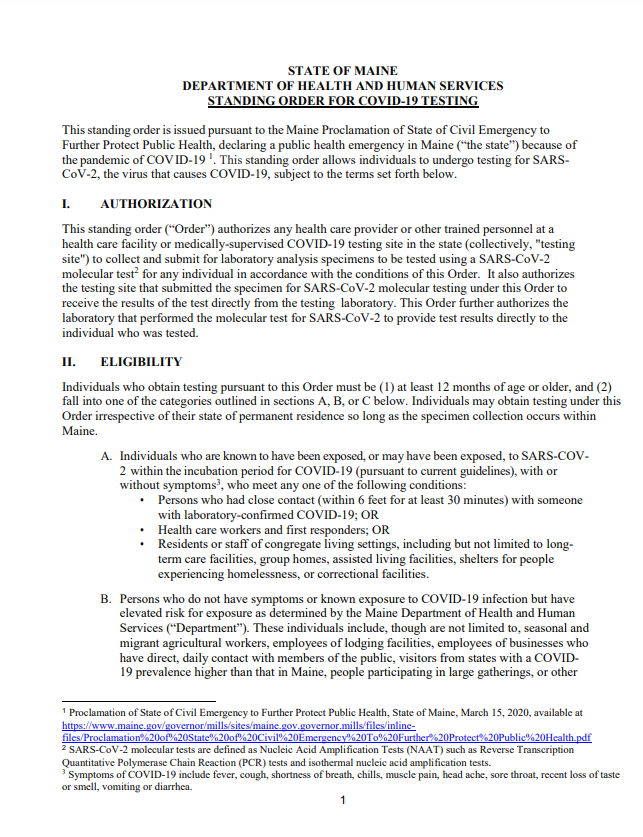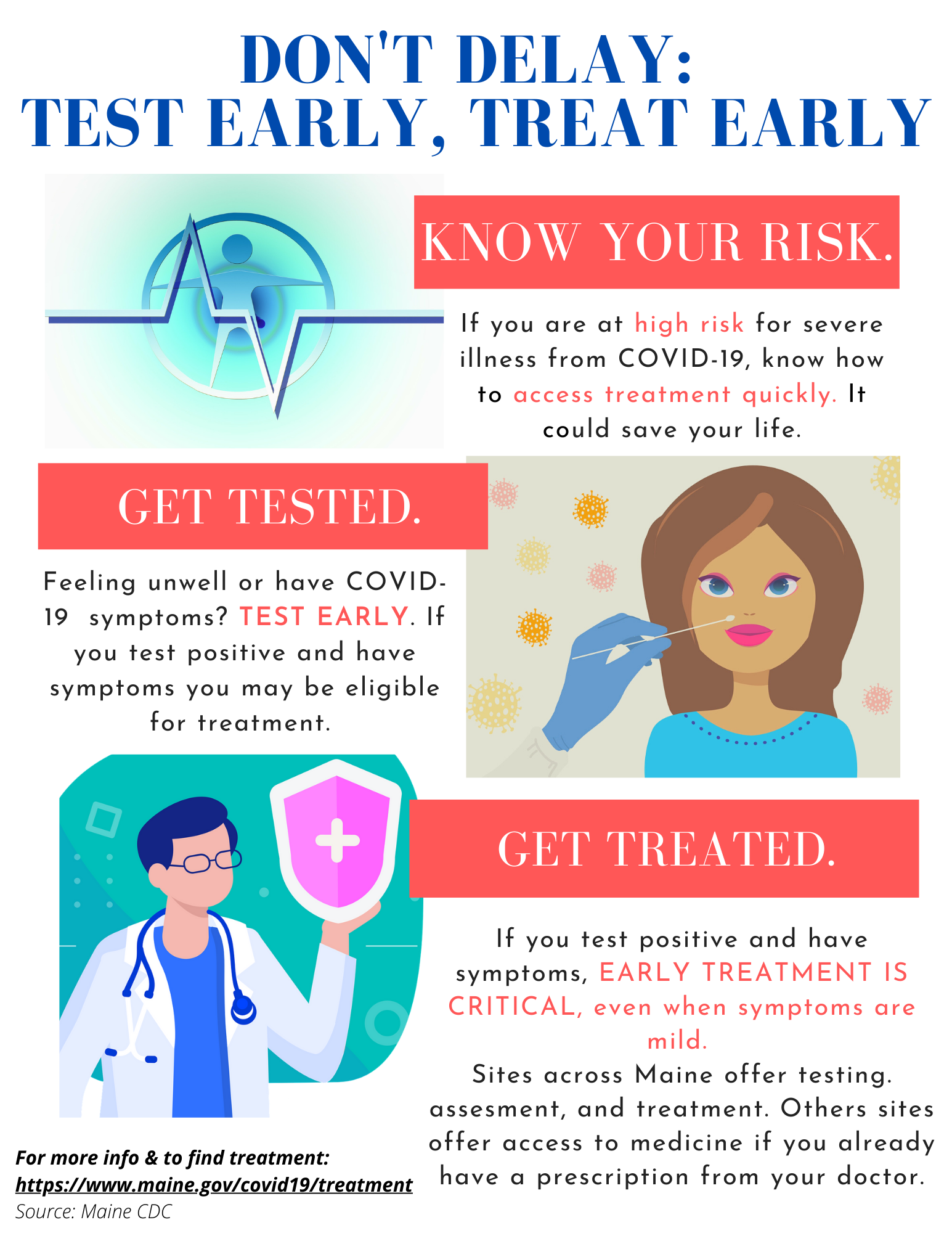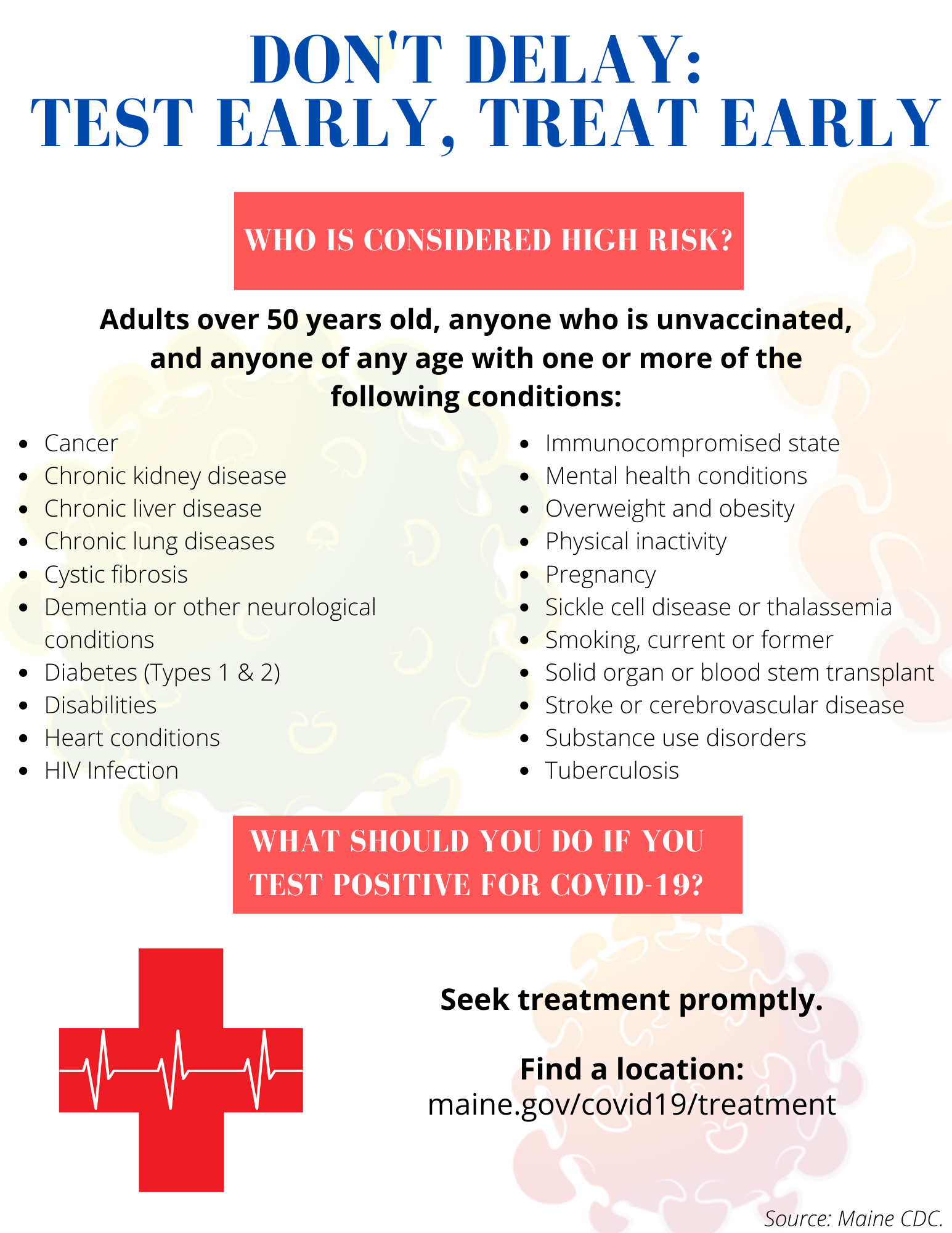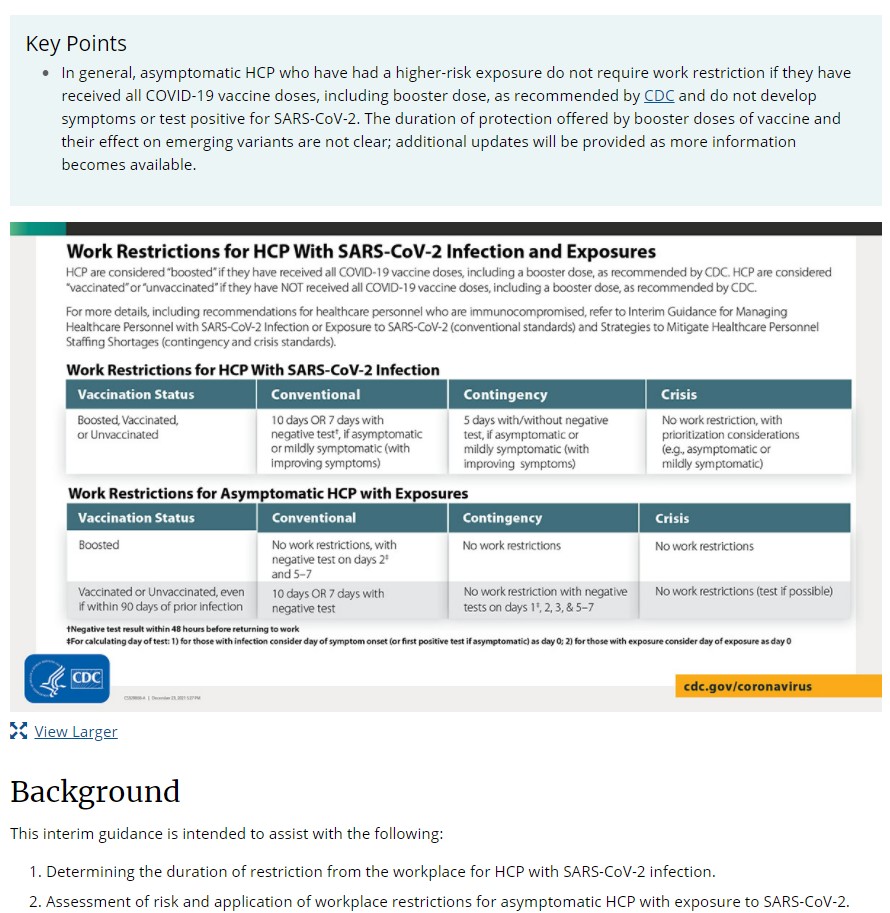DHHS → MeCDC → Disease Surveillance → Epidemiology → Airborne and Direct Contact Diseases → Coronavirus → Healthcare Providers
COVID-19: Healthcare Providers
On this page:
- COVID-19 Vaccines
- COVID-19 Treatments
- Long COVID Resources
- Standing Order
- COVID-19 Testing at Maine State Lab
- Maine CDC Point of Care Test Reporting
- Popular Resources
- Health Alert Network (HAN) Advisories
COVID-19 Vaccines
Vaccination against COVID-19 remains the best way to prevent severe illness, hospitalization, and death. Everyone 6 months and older should get an updated COVID-19 vaccine, even if they have previously gotten one or more doses of COVID-19 vaccine and even if they have had COVID-19 infection in the past. People between 6 months and 5 years may need multiple doses depending on prior vaccination. People with immunocompromising conditions, including those who take certain immunosuppressive medications, are at increased risk for severe COVID-19 and may get one or more additional doses of the updated (bivalent) vaccine.
- U.S. CDC: Stay Up to Date with COVID-19 Vaccines
- U.S. CDC: Use of COVID-19 Vaccines in the United States
- U.S. CDC: COVID-19 Vaccines for People who are Moderately or Severely Immunocompromised
COVID-19 Treatments
Outpatient treatment can reduce the risk of progressing from mild COVID-19 illness to severe illness, hospitalization, and death. Treatment should be offered to all eligible patients, including people who are vaccinated and people who have had a prior COVID-19 infection.
Oral and IV treatments are available for persons who have COVID-19 symptoms, a positive test (PCR or antigen, including at-home antigen tests), and one or more risk factors for severe disease, including:
- Age over 50 years, with risk increasing substantially at age ≥65 years
- Being unvaccinated or not being up to date on COVID-19 vaccinations
- Specific medical conditions and behaviors
Some people from racial and ethnic minority groups are at risk of being disproportionately affected by COVID-19 from many factors, including limited access to vaccines and healthcare. Clinicians should also consider these factors when evaluating the risk for severe COVID-19 and use of outpatient treatment.
Currently-available COVID-19 outpatient treatment options include:
- Paxlovid (nirmatrelvir/ritonavir) (PO) is a 5-day oral therapy, available for individuals 12+ years old at high risk for progression to severe COVID-19. It should be started within 5 days after COVID-19 symptoms begin. It is the treatment of choice for non-hospitalized patients. The PAXLOVID Patient Eligibility Screening Checklist Tool for Prescribers can help clinicians navigate drug-drug interactions.
- Paxlovid prescriptions should specify the numeric dose of each active ingredient in Paxlovid and a dispense-by (i.e., within 5 days after symptom onset), and optionally include a note that renal function has been reviewed and that medications have been reviewed/reconciled.
- Veklury (remdesivir) (IV) is a 3-day intravenous therapy, available for individuals 28 days old and older at high risk for progression to severe COVID-19. It should be started within 7 days after COVID-19 symptoms begin. It is the best option for patients who are unable to get Paxlovid due to drug-drug interaction. However, it is only available at selected facilities in Maine, primarily for patients under 12 years old. Consider using Veklury for patients who are hospitalized for a non-COVID-19 cause if Paxlovid is not available or they lack oral access.
- Lagevrio (molnupiravir) (PO) is a 5-day oral therapy, available for individuals 18+ years old at high risk for progression to severe COVID-19. It should be started within 5 days after COVID-19 symptoms begin. Best pick for patients unable to get Paxlovid due to drug-drug interaction or severe kidney or liver disease, who do NOT have access to an IV infusion site (for Veklury). Lagevrio is available under FDA Emergency Use Authorization. Eligibility is set by the FDA. Off-label prescribing is not allowed for drugs available under EUA.
No COVID-19 treatments are available for persons exposed to COVID-19 who have not tested positive (i.e., post-exposure prophylaxis), persons with asymptomatic COVID-19 infection, or persons who are not at high risk for severe disease. There are no monoclonal antibody therapies currently available for treatment or post-exposure prophylaxis (due to poor effectiveness against circulating variants).
Please continue to encourage patients at high risk for severe disease to test early and treat within the first few days after symptom onset, even if symptoms are mild. Many people with COVID-19 are at high risk for severe disease and can get treated, yet they do not learn about treatment options in time, or they encounter problems obtaining a prescription within the recommended timeframe. To aid in sharing information with patients about the availability of treatment, we created simple graphics that you can print, post, and give to patients. Download and print Don't Delay: Test Early, Treat Early (PNG) and Don't Delay: Who Is Considered High Risk? (PNG) to post and hand out to patients.
Free video training modules: COVID-19 Treatment in Maine: A Primer for Prescribers: Maine CDC, in collaboration with Maine clinicians and pharmacists, has developed a series of free videos covering who to treat for COVID-19, available drugs, how to select the right drug for your patient, and how to access treatments in Maine, with several case-based examples of common clinical scenarios. These are aimed at healthcare providers who are not yet familiar with COVID-19 outpatient treatment of COVID-19. The training is available for free as videos on YouTube, with accompanying slides (PDF).
Refer to COVID Treatment in Maine for information about pharmacies where patients can fill prescriptions for oral drugs and Test-to-Treat sites (e.g., hospitals, clinics, urgent care centers, and pharmacies) where patients can get tested, seen by a clinician, and treated with oral and IV drugs. Some locations offer telemedicine and/or home delivery services.
Patient information for COVID-19 treatment is also available at COVID Treatment in Maine.
As of December 2023, COVID-19 antivirals are now distributed via commercial channels. Most patients will still be able to access Paxlovid and Lagevrio through retail pharmacies or certain health care facilities as they had in the past. There are new patient assistance programs to support patients who are uninsured or underinsured. The U.S. government will continue to distribute free COVID-19 antivirals through federal partners including HRSA (which supports federally qualified health centers), IHS, DoD, and the VA. Additional information is provided in the Maine CDC health advisory _COVID-19 Outpatient Treatment Commercialization and Access_ (December 26, 2023).
- Paxlovid (nirmatrelvir-ritonavir)
- Medicare, Medicaid (MaineCare), and uninsured patients can get Paxlovid for free through 2024 via Pfizer’s U.S. Government Patient Assistance Program (USG PAP). Patients can self-enroll or can be enrolled by a caregiver, provider, or pharmacist. For more details, visit https://www.paxlovid.com/paxcess. Patients will be able to get prescriptions filled at a pharmacy or via overnight mail order. Retail pharmacies that would like to participate in the Patient Assistance Program should contact the program vendor at pharmacynetworkcontract102101@assistrx.com or call 877-219-7225.
- Pfizer is also operating a Paxlovid Co-Pay Savings Program for eligible commercially insured patients that can reduce out-of-pocket costs. For more information, visit paxlovid.com (for patients) and paxlovid.pfizerpro.com (for health care providers).
- Lagevrio (molnupiravir)
- The Merck Patient Assistance Program provides Lagevrio free of charge to patients who meet its eligibility criteria and who, without assistance, could not otherwise afford the product. Lagevrio is available through this pathway as an urgent need request. The healthcare provider must call 800-727-5400 and indicate that they are making an Urgent Need Request for Lagevrio. The representative will provide further instructions. The provider must follow the program representative’s instructions to make the request. Patients may also check their eligibility on MerckHelps.
Additional resources:
- U.S. CDC: Interim Clinical Considerations for COVID-19 Treatment in Outpatients
- NIH: COVID-19 Treatment Guidelines: Therapeutic Management of Nonhospitalized Adults
- HHS/ASPR clinical decision aid (PDF)
- PAXLOVID Patient Eligibility Screening Checklist Tool for Prescribers
- ASPR: COVID-19 Therapeutics Locator
- ASPR: Sunsetting the U.S. Government COVID-19 Therapeutics Distribution Program
Long COVID Resources for Clinicians
The following resources are available for Maine clinicians seeking information about Long COVID:
- U.S. CDC: Post-COVID Conditions: Information for Healthcare Providers
- U.S. Department of Veterans Affairs: Whole Health System Approach to Long COVID (PDF)
- UpToDate: COVID-19: Evaluation and management of adults with persistent symptoms following acute illness ("Long COVID") (subscription required)
- University of California Health Long-COVID/PASC Series (7 modules, offers CME through 2025)
- University of California Long COVID Education
- University of Toronto: COVID-19 Community of Practice for Ontario Family Physicians
- University of New Mexico: Long COVID and Fatiguing Illness Recovery Program (ongoing webinar series, recordings of past webinars, resource library, and quarterly 45-minute, self-paced short course intended to rapidly disseminate findings on emerging best practices)
- Brigham and Women’s COVID Recovery Center
Standing Order for SARS-CoV-2 Testing
On January 14, 2022, Maine CDC issued a revised Standing Order (“Order”) that authorizes any health care provider or other trained personnel at a health care facility or medically-supervised COVID-19 collection site (collectively, “collection site”) in the state to collect and submit for laboratory analysis specimens to be tested using a SARS-CoV-2 PCR molecular or antigen test for any individual in accordance with the conditions of the Order. Read the Standing Order (PDF).
The Order is not meant to replace existing patient-provider relationships or provider-laboratory relationships.
The Order also authorizes the collection site that submitted the specimen for SARS-CoV-2 molecular or antigen testing under this Order to receive the results of the test directly from the testing laboratory. This Order further authorizes the laboratory that performed the molecular or antigen test for SARS-CoV-2 to provide test results directly to the individual who was tested, with the individual’s consent.
COVID-19 Testing at Maine's Health and Environmental Testing Laboratory (HETL)
Maine's Health and Environmental Testing Laboratory (HETL) will no longer process routine COVID-19 samples received after December 28, 2022. Maine CDC encourages facilities to secure alternative COVID-19 laboratory testing options to avoid potential interruption to testing prior to December 28, 2022.
Maine CDC recommends following the Infectious Diseases Society of America (IDSA) Guidelines on the Diagnosis of COVID-19. Read the IDSA Guidelines.
Maine CDC Point of Care (POC) Test Reporting
Maine CDC requests that all providers using Point of Care (POC) tests report results through the REDCap online reporting system. For information on how to register and report, visit Maine CDC Point of Care Test Reporting (PDF)
All positive results must be reported to Maine CDC using REDCap.
Popular Resources
Health Alert Network (HAN) Advisories
Access all Maine CDC Health Alert Network Advisories here.
The MaineHAN is a secure, web-based communication system used by Maine CDC and its partners to exchange information within and between their respective agencies. Physicians, nurses, hospital staff, emergency preparedness and mangement personal, first responders, and other public health workers are encouraged to sign up.
Access all Maine CDC Health Alert Network Advisories here.
The MaineHAN is a secure, web-based communication system used by Maine CDC and its partners to exchange information within and between their respective agencies. Physicians, nurses, hospital staff, emergency preparedness and mangement personal, first responders, and other public health workers are encouraged to sign up.
